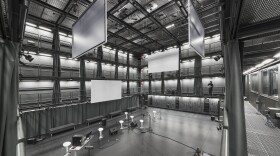It wasn't all that long ago that bicycles and horses ruled the road. But the advent of cars displaced them with the warning, 'ride at your own risk', or stay off the roads together.
Today cyclists try to share the roadways with cars, but if there's a crash, it's the bike that usually takes the brunt, and many are killed. That's what happened to Hector Avalos, a young man who went everywhere on his bike. A new documentary play tells his story. It's opening this week in the Cube at Virginia Tech.
"When I'm playing him, I am a mothers' son, I am a fiancé...." says theater performance major Rodney McKeithan. He plays the late, Hector Avalos, in the new play titled, Right of Way.
"He was on his way home from work one night it was dark out and he was hit from behind by a drunk driver," McKeithan explains. Avalos was killed in the crash. The driver pleaded guilty, has shown deep remorse for what happened and got a hundred-day jail sentence and.
This real-life story struck director Thomas Murray. He is working on a degree in directing and public dialogue at Virginia Tech's School of Performing Arts. The major is the only one of its kind in the country. So, his play runs by the rules of documentarians everywhere: In-depth interviews from several sources, research, writing and fact checking. What's different about it is that it's staged for a live theater performance.
"So, in The Right of Way, all the words were spoken to me or to my documentarian friends. We haven't fictionalized or made up anything," says Murray. He began his research by reaching out to the dead man's mother.
"And we met in a diner and she just poured out what it was like to raise him as a single mother the immense grief she was carrying in the months after he had passed and then she trusted me enough to intro me to his girlfriend and his close circle of friends and the interviews rippled out from there."
One of the stories he heard was from Hector's best friend, Rob. The two of them had sort of a pact to ride their bikes everywhere: To work, social occasions, everything. They liked the way it made them feel. Then one day, they rolled up next to a motorcycle at a light. Rob told Hector he felt a little intimidated by the growling machine there next to him, like maybe that's what 'real men' ride. But then Hector, as played by Rodney McKeithan, said "nah, he's riding a machine but we are the machine. Who's the real man now?"
Right of Way will be performed 'in the round' in the Cube Theater in Blacksburg. The sound is meant to immerse people in what it's like out there on the roads for drivers who's speed is often several orders of magnitude what a cyclists is.
"Traveling at the speeds that we do in our automobiles, our brains can't quite keep up with the environment. The faster we go, the more our cone of vision narrows, so we miss bicyclists and pedestrians, in part, because they're traveling at a different speed and they're out of our peripheral vision. And because there aren’t' as many of them we're not trained to look for them," Murray argues. "Whereas, if we had protective bike lanes that would allow more bikes to get on the road and be used as a form of transit, then they would be more common and we'd be more attuned to looking at them. But in the current infrastructure, crashes like what happened to Hector are almost doomed to happen."
Murray says he wrote this play as a way to start conversations in communities around the country. After each of the three performances in the Cube at the Moss Arts Center, the alternative transportation advocacy group, RIDE Solutions will host a brief discussion with the audience.


